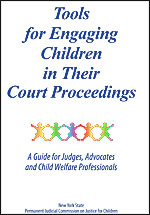|

YOUTH AGING OUT OF CARE
|
| |
Current Commission Products:
Domonica’s Story| 10 Actions Help Meet the Needs of Youth Aging Out | Handbook |
| |
As a means to promote the safety, permanency and well-being for all older New York State youth who are aging out of foster care, the Commission is working to increase self-advocacy by youth in care including their meaningful participation in their permanency hearings (special court hearings where the health, well-being and future steps for children in out-of-home care are reviewed and determined with the goal of achieving permanency for these children) and in the creation and on-going crafting of their Transition Plans.
The Commission developed and conducted a training session for judges, advocates and child welfare professionals – called Empower Me – Encourage And Support Self-advocacy By Youth In Foster – that focuses on the needs and issues facing older youth in foster care – and, in particular, youth aging out of care – including:
- Benefits of Staying in Care Until 21
- Transition Plan
- Education and Career Goals
- Permanent Resource
- Credit Report
- Parenting
To complement this training, the Commission incorporated a youth’s story – Domonica’s story – to highlight the need for longer-term supports for older youth in care while underscoring the importance of having a permanent resource for youth aging out of care and ensuring that these young adults know what supports are available to them – including housing, education, health care and childcare – and have the skills and knowledge needed to access them. |
| |
| Domonica’s Story |
| |
 To reinforce the importance of encouraging older youth to participate in court hearings and other planning opportunities that address their needs, issues and goals, the Commission revisited a youth who had participated in the Hear Me! Hear Me! Hear Me! digital stories regarding the importance of youth participation in their permanency hearings. Four years later, Domonica had aged out of care and now shares her experiences to help identify and put a face on the needs and issues facing older youth in care and, in particular, youth aging out of care. To reinforce the importance of encouraging older youth to participate in court hearings and other planning opportunities that address their needs, issues and goals, the Commission revisited a youth who had participated in the Hear Me! Hear Me! Hear Me! digital stories regarding the importance of youth participation in their permanency hearings. Four years later, Domonica had aged out of care and now shares her experiences to help identify and put a face on the needs and issues facing older youth in care and, in particular, youth aging out of care.
 Domonica’s Story VIDEO (run time: 8.3 minutes, wmv format - can be played in a variety of viewers) Domonica’s Story VIDEO (run time: 8.3 minutes, wmv format - can be played in a variety of viewers)
|
|
| |
10 Actions that Help Address Needs/Issues of Youth Aging Out of Care
The following is an example of 10 actions empowered youth – with the needed skills, knowledge and assistance – can take to address many of the needs and issues that Domonica highlights in her story.
|
| 10 Actions to Help Meet the Needs/Issues of Older Youth in Foster Care and Youth Aging Out of Care |
- Stay in foster care until age 21! If leaving before 21, understand your rights to trial discharge and re-entry.
- Participate in planning your future by attending permanency planning hearings and service plan reviews and participate in the development of your transition plan.
- Review and access case records and get copies of important documents (e.g., immunization records, school records, birth certificate, social security card and medical insurance cards).
- Conduct an annual credit check.
- Get a driver’s license or identification card and register to vote.
- Apply for scholarships/vouchers to go to college, a vocational school or job training program.
- Plan for medical coverage after leaving care.
- Connect with services in local community (e.g., get help locating a place to live, help with initial or ongoing rent).
- Determine eligibility to receive money from the government to help make ends meet, buy food and/or have child care.
- Create a Permanency Pact or other permanent connection with adults who are willing to be a permanency resource once you leave care.
Source: NYS Permanent Judicial Commission on Justice for Children. 2012. Modified version of The Bar-Youth Empowerment Project’s 10 Things to Remember When You Are Leaving Foster Care. American Bar Association Center on Children and the Law. |
|
| |
| Handbook |
| |
 This training is based on the curriculum that complements the Commission’s Tools for Engaging Children in their Court Proceedings handbook. The Tools handbook highlights the developmental stages of school-age children (ages 5 to 20 years), provides a series of age-appropriate questions and tips on how to engage children in their court proceedings. This training is based on the curriculum that complements the Commission’s Tools for Engaging Children in their Court Proceedings handbook. The Tools handbook highlights the developmental stages of school-age children (ages 5 to 20 years), provides a series of age-appropriate questions and tips on how to engage children in their court proceedings.
Access the Handbook
|
| |
|
|
©2009-2012 - All
Rights Reserved.
 |
|
|

